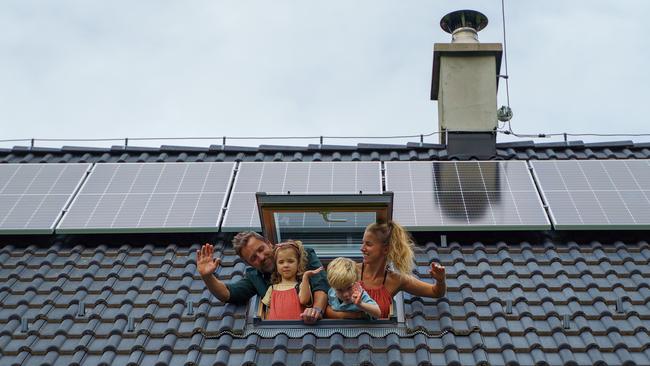Small changes that can save you big bucks on your power bill
Making a few small changes at home could mean big savings on your power bill this summer and beyond.

Property
Don't miss out on the headlines from Property. Followed categories will be added to My News.
It’s no secret energy costs have skyrocketed this year, but by making a few tweaks to your family’s energy habits it is possible to cut hundreds from your yearly power bill.
POWER HIKES
Benchmark pricing from the energy regulator has soared about 27 per cent since July this year, equating to a yearly increase of $259 to $512 for many Australian families, Finder’s energy expert Mariam Gabaji says.
According to Energy Consumers Australia CEO Dr Brendan French, lower income families are most feeling the pinch, with those earning less than the median household income spending up to 12 per cent of their take home pay just to keep the power on.

CUTTING COSTS
Ms Gabaji says there are several small changes families can make in order to keep power costs down.
The first is as simple as calling your energy provider.
“Find out if you can get a cheaper rate,” she says. “The next step would be to compare plans from other providers.”
Finder data shows there is a massive difference between the cheapest and most expensive providers, with postcode comparisons ranging from $390 to $690 a year.
Dr French says those families who are really struggling to pay their power bills should reach out for help.

“If you are having difficulty paying your bills you have a right to ask your retailer for help – and retailers have an obligation to provide assistance,” he says.
“Also, make sure that any concession card holder in your household is on the bill, otherwise you may not be eligible for state government concessions.”
KEEPING YOUR COOL
Heating and cooling typically make up about 40 per cent of household energy use, says Dr French, so it pays to be savvy when keeping cool this summer.
“Only cooling rooms that are in use and closing doors are good steps to take,” he says.
“The temperature you set your air conditioner to also matters as every degree up or down can alter energy use and impact bills. Ideally, in summer, your air conditioner should be set to 24 to 26 degrees.”

Each extra degree of cooling can add 5-10 per cent to your energy bill, while clogged filters can reduce energy efficiency, so it’s important to keep them clean, Ms Gabaji says.
If you have a swimming pool, investing in an energy efficient pump can save you hundreds each year.
“A Your Energy Savings report found that a two star rated product cost around $285 a year more to run than an eight star version,” she says.
MIND THE TIME
The time of day you use appliances can make a huge difference to your energy costs if you are on a time of use plan where you pay more per kilowatt during peak times.
“Using appliances during off-peak times, when electricity is typically cheaper, can also help lower your bills,” Dr French says.

“If you have a dishwasher, try scheduling a load for after 10pm and make sure it’s a full load, because partial loads use the same amount of water and electricity.
“When and how you use appliances makes a difference. Heating water makes up around 20 per cent of your energy use so washing laundry in cold water can help.
SOLAR HABITS
While investing in solar panels can make a huge difference to a household’s power bills, energy expert Stefan Jarnason from Solar Analytics says households with solar panels have also been hit by July’s price hikes if relying on the grid when solar isn’t available.
“If you had solar on your roof, your electricity bill may have gone from being $30 a month to being $100 a month, so it may have more than doubled,” he says.

He says diverting big load appliances like hot water systems, airconditioning and EV chargers to use solar energy during the day could save households hundreds of dollars a year.
Mum of two Erin Hamilton cut down her monthly energy costs by $1100 by installing solar panels and a battery. She says a big part of the savings came from diverting surplus solar towards her hot water system, rather than using off peak energy from the grid.
“That saves us probably $600 to $700,” she says.
More Coverage
Originally published as Small changes that can save you big bucks on your power bill




